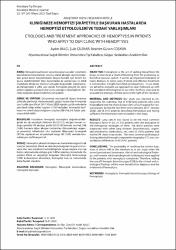Kliniğimize hemoptizi şikâyetiyle başvuran hastalarda hemoptizi etyolojileri ve tedavi yaklaşımları
Citation
Balcı, A. , Çilekar, Ş. & Çoşğun, İ. G. (2021). KLİNİĞİMİZE Kliniğimize hemoptizi şikâyetiyle başvuran hastalarda hemoptizi etyolojileri ve tedavi yaklaşımları . Kocatepe Tıp Dergisi , CİLT: 22 SAYI: 3 MAYIS 2021 ÖZEL SAYISI , 197-201 . DOI: 10.18229/kocatepetip.702028Abstract
AMAÇ: Hemoptizi pulmoner veya bronşiyal vasküler sistemden kaynaklanan kanamaların sonucu olarak akciğer veya bronşlardan gelen kanın tükürülmesidir. Birçok hastalık için önemli bir ipucu olabilmektedir. Bazı durumlarda da zamanında ve etkili müdahale olmaz ise ölümcül sonuçlar doğurabilir. Çalışmamızda kliniğimizde 3 yıllık süre içinde hemoptizi şikayeti ile takip edilen vakalara yaklaşımımız ve bu vakaların etiyolojilerini literatür eşliğinde değerlendirmeyi amaçladık.
GEREÇ VE YÖNTEM: Çalışmamız retrospektif dosya taraması şeklinde planlandı. Hastanemizde, göğüs hastalıkları kliniğinde son 3 yıllık süre (Ocak 2017-Ocak 2020) içinde çeşitli nedenlerle yatırılarak takip edilen toplam 3150 hastadan, hemoptizi tarifleyen ve yeterli dosya bilgisine ulaşılan 200 (%6,34) hasta çalışmaya dahil edildi.
BULGULAR: Hastaların hemoptizi etyolojileri değerlendirildiğinde en sık etiyolojik faktörün 63 (%31,5) akciğer kanseri olduğu görüldü. PA akciğer grafisi 32 (%16) hastada normal, 168 (%84) hastada diğer akciğer hastalıkları (Bronşiektazi, organize pnömoni, tüberküloz v.b.) saptandı. Bilgisayarlı tomografi (BT)’de saptanan en sık patolojik bulgu 90 (%45) hastada konsolidasyon (infiltrasyon) idi.
SONUÇ: Hemoptizi şikâyeti ile başvuran hastalarda doğru klinik süreçler (anamnez, klinik ve radyolojik bulgular ile gerekirse invaziv ileri tanı teknikleri) kullanıldığında tanıya ulaşma olasılığı bizim çalışmamızda olduğu gibi %90’ın üzerine çıkmaktadır. Bu yüzden Klinik ve radyolojik bulgulara fiberoptik bronkoskopi (FOB) kullanımının eklenmesi, hemoptizi tanı ve tedavisinde daha faydalı olacaktır. OBJECTIVE: Hemoptysis is the act of spitting blood from the lungs or bronchi as a result of bleeding from the pulmonary or bronchial vascular system. It can be an important indication of many diseases. In some cases, if timely and effective treatment is not possible, it might. have fatal consequences. In our study, we aimed to evaluate our approach to cases followed up with the complaint of hemoptysis in our clinic for three years and to evaluate the etiology of these cases in the light of the literature. MATERIAL AND METHODS: Our study was planned as retrospective file scanning. Out of 3150 total patients who were hospitalized into the chest disease clinic of our hospital for various reasons during the last three years (January 2017- January 2020), 200 (6.34%) patients describing hemoptysis and having sufficient file information were included in the study. RESULTS: Lung cancer was found to be the most common etiological factor in 63 (31.5%) patients after the evaluation of the hemoptysis etiologies of them. 168 (84%) patients were diagnosed with other lung diseases (bronchiectasis, organized pneumonia, tuberculosis, etc.) and 32 (16%) patients had normal PA chest x-ray results. The most common pathological finding detected through computed tomography (CT) was consolidation (infiltration) in 90 (%45) patients. CONCLUSIONS: The probability of reaching the correct diagnosis is above %90 in the literature as in our study when the correct procedures (anamnesis, clinical and radiological findings, and invasive advanced diagnostic techniques) were applied to the patients with hemoptysis complaints. Therefore, adding the use of Fiberoptic Bronchoscopy (FOB) to the clinical and radiological findings will be more beneficial on diagnosis and the treatment of hemoptysis.
















